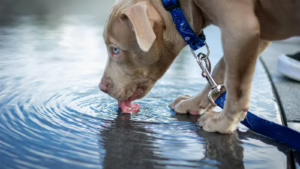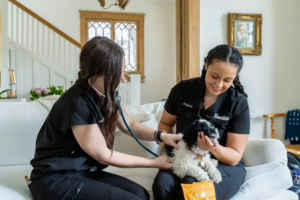As pet owners, we’re all familiar with those moments when our furry companions aren’t acting quite like themselves. Maybe they’re acting lethargic , or perhaps they’re coughing or sneezing out of the blue. When a dog or cat’s behavior suddenly changes, it can be worrisome. While it’s easy to panic and rush straight to the emergency room, not every situation requires immediate, life-saving intervention — this is where urgent care for pets comes in.
If your pet is showing signs of discomfort, illness or an injury that requires attention sooner rather than later, urgent care bridges the gap between a regular vet visit and an emergency room situation.
What’s the difference between urgent care and emergency care?
Understanding when to seek veterinary urgent care versus emergency care can be confusing, especially when it comes to our beloved dogs or cats. Though there’s some overlap, the key difference lies in the severity of the condition.
- Emergency care is typically needed when your pet’s condition is life-threatening or requires immediate hospitalization. Think of situations where your pet is in severe distress, bleeding profusely, or has experienced a serious injury or illness that could cause long-term damage if not treated immediately.
- Urgent care is for conditions that are concerning but not necessarily life-threatening. Urgent care is used when you recognize that something isn’t right, but it’s not an emergency. These are cases where medical attention is needed soon —often within a day — but not necessarily on the spot.
In short, urgent care is for when you’re concerned about your pet’s health for issues that aren’t immediately life-threatening, and you need veterinary care in the same or next day. Essentially, urgent care for pets is whenever you think to yourself, “I think something’s wrong — a vet should take a look at this ASAP.”
When should I seek urgent care?
If your pet is sick or injured, you might be wondering if it’s an emergency or just a routine issue. Of course, some situations are obvious (e.x. severe bleeding or a broken bone) but there are other scenarios where it can be hard to tell. Here are common situations when urgent care for pets is recommended:
- Allergic reactions (swelling, hives)
- Anal-gland scooting, licking or discomfort
- Bite wounds, cuts or scratches
- Bleeding from small cuts, lacerations or nail breakage
- Constipation or difficulty defecating
- Coughing, sneezing or nasal discharge
- Decreased/increased appetite or refusing to eat
- Dehydration
- Diarrhea
- Ear infections
- End-of-life care (euthanasia)
- Eye squinting, excessive tearing or discharge
- Fever
- Fracture assessments (especially if you’re unsure about a bone injury)
- Hiding or lethargy (a sign something’s off)
- Ingesting poison or toxic substances (Make sure you call the poison hotline right away 855-764-7661 and then call us to assist with the treatment plan)
- Lacerations or cuts
- Limping (especially if there’s no visible injury)
- Parasites (fleas, ticks, worms)
- Skin allergies, skin growths, rashes or hotspots
- Urinary issues, such as UTIs, frequent urination or difficulty urinating
- Vomiting (especially if it persists)
- Immediate wellness care like vaccines, bloodwork or heartworm prevention
In general, any time your pet is showing abnormal behavior, acting differently or showing signs of distress, it’s worth considering urgent care. A quick visit can help rule out any serious conditions and give you peace of mind.
What to expect during your pet’s urgent care visit
If you think your pet needs urgent care, it’s important to get them seen by a veterinarian as soon as possible. Most urgent care clinics offer convenient same or next-day appointments, often during evening or weekend hours when traditional veterinarian clinics are closed. The experience of taking your dog or cat to an urgent care clinic is very similar to the human experience.
When you initially contact an urgent care veterinary clinic, you’ll be asked a few questions about your pet’s symptoms so the staff can determine whether your pet needs immediate attention or not. This helps ensure your pet gets the appropriate level of care in a timely manner.
Once you arrive, an urgent care vet will assess your pet’s condition. They may start by asking for a detailed history of symptoms or any recent changes in behavior, followed by a physical exam. Depending on the situation, an urgent care vet may recommend further tests (like bloodwork or X-rays), prescribe medication or provide treatments that alleviate discomfort and pain.
If your pet’s condition turns out to be more serious, an urgent care veterinarian may refer you to a veterinary emergency hospital or a specialist for advanced care; however, in many cases, an urgent care vet can manage your pet’s condition effectively.
Why choose urgent care?
The flexibility of an urgent care veterinary clinic can be a game-changer for pet owners. Unlike traditional veterinary clinics, urgent care vet clinics are often open later in the evenings, weekends and even holidays. This makes them a great option for those times when you need to get your pet seen quickly, but it’s not an emergency that requires a visit to the ER.
Because urgent care is designed to handle cases that are not life-threatening, it’s a more affordable option than going straight to an emergency room. It helps pet parents access the care they need without long wait times or hefty costs that can come with emergency services.
Whether your pet has a minor injury, is uncomfortable or sick, urgent care provides a convenient, cost-effective option for getting them the help they need quickly. If you’re ever unsure, it’s always a good idea to trust your instincts — if something doesn’t seem right with your pet, it’s better to err on the side of caution and seek urgent care sooner rather than later.
At ReadiVet Dallas, we aim to be here for you where you need us, when you need us. We offer both mobile veterinary care in the comfort of your home and expert urgent care services in the convenience of our Uptown Dallas clinic. Learn more about our Dallas care services here.




